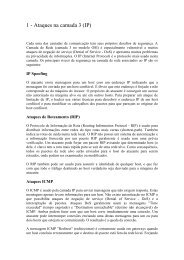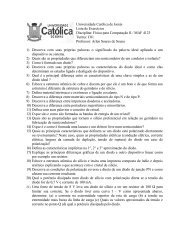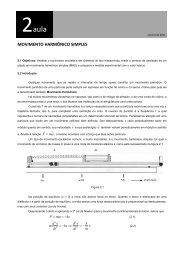- Page 2:
This page intentionally left blank
- Page 8:
Brief ContentsPrefacexiPART IGenera
- Page 12:
Contents vINDIRECT (UNOBTRUSIVE) OB
- Page 16:
Contents viiQUASI-EXPERIMENTS 321Th
- Page 20:
About the AuthorsJOHN J. SHAUGHNESS
- Page 24:
PrefaceWith this 9th edition we mar
- Page 28:
Preface xiiimuch information that n
- Page 32:
Preface xvFor StudentsMultiple choi
- Page 36:
PART ONEGeneral Issues
- Page 40:
CHAPTER 1: Introduction 3THE SCIENC
- Page 44:
CHAPTER 1: Introduction 5FIGURE 1.1
- Page 48:
CHAPTER 1: Introduction 7Key Concep
- Page 52:
CHAPTER 1: Introduction 9FIGURE 1.2
- Page 56:
CHAPTER 1: Introduction 11character
- Page 60: CHAPTER 1: Introduction 13an exampl
- Page 64: CHAPTER 1: Introduction 15THINKING
- Page 68: CHAPTER 1: Introduction 17and stati
- Page 72: CHAPTER 1: Introduction 19• A mul
- Page 76: CHAPTER 1: Introduction 21STRETCHIN
- Page 80: CHAPTER 1: Introduction 23Key Conce
- Page 84: CHAPTER 1: Introduction 25CHALLENGE
- Page 88: CHAPTER TWOThe Scientific MethodCHA
- Page 92: CHAPTER 2: The Scientific Method 29
- Page 96: CHAPTER 2: The Scientific Method 31
- Page 100: CHAPTER 2: The Scientific Method 33
- Page 104: CHAPTER 2: The Scientific Method 35
- Page 108: CHAPTER 2: The Scientific Method 37
- Page 114: 40 PART I: General Issuestestable h
- Page 118: 42 PART I: General IssuesFIGURE 2.4
- Page 122: 44 PART I: General IssuesQualitativ
- Page 126: 46 PART I: General IssuesKey Concep
- Page 130: 48 PART I: General IssuesKey Concep
- Page 134: 50 PART I: General IssuesKey Concep
- Page 138: 52 PART I: General Issuesindependen
- Page 142: 54 PART I: General Issuescauses be
- Page 146: 56 PART I: General IssuesInternet t
- Page 150: 58 PART I: General IssuesINTRODUCTI
- Page 154: 60 PART I: General IssuesFIGURE 3.1
- Page 158: 62 PART I: General IssuesViolation
- Page 162:
64 PART I: General IssuesKey Concep
- Page 166:
66 PART I: General IssuesSTRETCHING
- Page 170:
68 PART I: General IssuesResearcher
- Page 174:
70 PART I: General IssuesBOX 3.1TIP
- Page 178:
72 PART I: General IssuesSTRETCHING
- Page 182:
74 PART I: General IssuesBOX 3.2TO
- Page 186:
76 PART I: General IssuesKelman (19
- Page 190:
78 PART I: General Issuesa particul
- Page 194:
80 PART I: General IssuesFIGURE 3.8
- Page 198:
82 PART I: General Issues• Proper
- Page 202:
84 PART I: General IssuesTABLE 3.1E
- Page 206:
86 PART I: General Issuesresearch.
- Page 210:
88 PART I: General Issuesattitudes
- Page 214:
90 PART I: General Issuesthe benefi
- Page 218:
CHAPTER FOURObservationCHAPTER OUTL
- Page 222:
94 PART II: Descriptive MethodsSAMP
- Page 226:
96 PART II: Descriptive MethodsKey
- Page 230:
98 PART II: Descriptive MethodsBOX
- Page 234:
100 PART II: Descriptive MethodsHar
- Page 238:
102 PART II: Descriptive MethodsBOX
- Page 242:
104 PART II: Descriptive MethodsFIG
- Page 246:
106 PART II: Descriptive Methodsbet
- Page 250:
108 PART II: Descriptive Methodscan
- Page 254:
110 PART II: Descriptive MethodsKey
- Page 258:
112 PART II: Descriptive MethodsKey
- Page 262:
114 PART II: Descriptive Methodsthr
- Page 266:
116 PART II: Descriptive MethodsBOX
- Page 270:
118 PART II: Descriptive MethodsTAB
- Page 274:
120 PART II: Descriptive Methods•
- Page 278:
122 PART II: Descriptive Methods(Wh
- Page 282:
124 PART II: Descriptive MethodsTAB
- Page 286:
126 PART II: Descriptive Methodstim
- Page 290:
128 PART II: Descriptive Methods(Fe
- Page 294:
130 PART II: Descriptive Methodstop
- Page 298:
132 PART II: Descriptive MethodsOth
- Page 302:
134 PART II: Descriptive MethodsKEY
- Page 306:
136 PART II: Descriptive Methodswer
- Page 310:
138 PART II: Descriptive MethodsOVE
- Page 314:
140 PART II: Descriptive Methodsque
- Page 318:
142 PART II: Descriptive MethodsKey
- Page 322:
144 PART II: Descriptive MethodsKey
- Page 326:
146 PART II: Descriptive MethodsBOX
- Page 330:
148 PART II: Descriptive MethodsSTR
- Page 334:
150 PART II: Descriptive MethodsPer
- Page 338:
152 PART II: Descriptive Methodsmay
- Page 342:
154 PART II: Descriptive MethodsIRB
- Page 346:
156 PART II: Descriptive MethodsFIG
- Page 350:
158 PART II: Descriptive MethodsKey
- Page 354:
160 PART II: Descriptive Methodssam
- Page 358:
162 PART II: Descriptive MethodsKey
- Page 362:
164 PART II: Descriptive Methodsfee
- Page 366:
166 PART II: Descriptive MethodsTAB
- Page 370:
168 PART II: Descriptive Methods3 W
- Page 374:
170 PART II: Descriptive Methodsto
- Page 378:
172 PART II: Descriptive Methodssel
- Page 382:
174 PART II: Descriptive MethodsKey
- Page 386:
176 PART II: Descriptive MethodsKey
- Page 390:
178 PART II: Descriptive MethodsSam
- Page 394:
180 PART II: Descriptive MethodsCHA
- Page 398:
182 PART II: Descriptive Methods2 A
- Page 402:
CHAPTER SIXIndependent Groups Desig
- Page 406:
186 PART III: Experimental MethodsP
- Page 410:
188 PART III: Experimental MethodsK
- Page 414:
190 PART III: Experimental MethodsF
- Page 418:
192 PART III: Experimental Methodst
- Page 422:
194 PART III: Experimental MethodsK
- Page 426:
196 PART III: Experimental Methodsd
- Page 430:
198 PART III: Experimental MethodsS
- Page 434:
200 PART III: Experimental MethodsT
- Page 438:
202 PART III: Experimental MethodsK
- Page 442:
204 PART III: Experimental MethodsK
- Page 446:
206 PART III: Experimental MethodsB
- Page 450:
208 PART III: Experimental Methodsy
- Page 454:
210 PART III: Experimental Methodsm
- Page 458:
212 PART III: Experimental Methodsa
- Page 462:
214 PART III: Experimental MethodsT
- Page 466:
216 PART III: Experimental MethodsF
- Page 470:
218 PART III: Experimental MethodsK
- Page 474:
220 PART III: Experimental Methodsd
- Page 478:
222 PART III: Experimental MethodsC
- Page 482:
224 PART III: Experimental Methods3
- Page 486:
226 PART III: Experimental MethodsO
- Page 490:
228 PART III: Experimental MethodsB
- Page 494:
230 PART III: Experimental MethodsK
- Page 498:
232 PART III: Experimental Methodsr
- Page 502:
234 PART III: Experimental MethodsT
- Page 506:
236 PART III: Experimental Methodst
- Page 510:
238 PART III: Experimental MethodsT
- Page 514:
240 PART III: Experimental MethodsD
- Page 518:
242 PART III: Experimental Methodsc
- Page 522:
244 PART III: Experimental MethodsC
- Page 526:
246 PART III: Experimental MethodsK
- Page 530:
248 PART III: Experimental MethodsA
- Page 534:
250 PART III: Experimental MethodsO
- Page 538:
252 PART III: Experimental Methodsi
- Page 542:
254 PART III: Experimental MethodsT
- Page 546:
256 PART III: Experimental MethodsK
- Page 550:
258 PART III: Experimental MethodsS
- Page 554:
260 PART III: Experimental Methodsm
- Page 558:
262 PART III: Experimental Methods
- Page 562:
264 PART III: Experimental Methods
- Page 566:
266 PART III: Experimental Methodsc
- Page 570:
268 PART III: Experimental Methods(
- Page 574:
270 PART III: Experimental MethodsI
- Page 578:
272 PART III: Experimental MethodsF
- Page 582:
274 PART III: Experimental MethodsH
- Page 586:
276 PART III: Experimental Methodsi
- Page 590:
278 PART III: Experimental Methods(
- Page 594:
CHAPTER NINESingle-Case Designs and
- Page 598:
282 PART IV: Applied Researchintere
- Page 602:
284 PART IV: Applied Researcharticl
- Page 606:
286 PART IV: Applied Researchor uni
- Page 610:
288 PART IV: Applied ResearchSTRETC
- Page 614:
290 PART IV: Applied ResearchSusan
- Page 618:
292 PART IV: Applied ResearchFIGURE
- Page 622:
294 PART IV: Applied ResearchKey Co
- Page 626:
296 PART IV: Applied Research• Et
- Page 630:
298 PART IV: Applied ResearchBOX 9.
- Page 634:
300 PART IV: Applied ResearchKey Co
- Page 638:
302 PART IV: Applied Researchwoven
- Page 642:
304 PART IV: Applied ResearchFIGURE
- Page 646:
306 PART IV: Applied Researchof beh
- Page 650:
308 PART IV: Applied ResearchB Expl
- Page 654:
310 PART IV: Applied ResearchOVERVI
- Page 658:
312 PART IV: Applied ResearchBOX 10
- Page 662:
314 PART IV: Applied Researchsuch c
- Page 666:
316 PART IV: Applied ResearchKey Co
- Page 670:
318 PART IV: Applied Researchthat a
- Page 674:
320 PART IV: Applied ResearchOne sp
- Page 678:
322 PART IV: Applied ResearchQuasi-
- Page 682:
324 PART IV: Applied ResearchThe da
- Page 686:
326 PART IV: Applied ResearchFIGURE
- Page 690:
328 PART IV: Applied Researchassign
- Page 694:
330 PART IV: Applied ResearchDiffer
- Page 698:
332 PART IV: Applied ResearchKey Co
- Page 702:
334 PART IV: Applied ResearchFIGURE
- Page 706:
336 PART IV: Applied ResearchAs bef
- Page 710:
338 PART IV: Applied Research(effic
- Page 714:
340 PART IV: Applied Researchsocial
- Page 718:
342 PART IV: Applied ResearchKEY CO
- Page 722:
344 PART IV: Applied ResearchAnswer
- Page 726:
CHAPTER ELEVENData Analysis and Int
- Page 730:
348 PART V: Analyzing and Reporting
- Page 734:
350 PART V: Analyzing and Reporting
- Page 738:
352 PART V: Analyzing and Reporting
- Page 742:
354 PART V: Analyzing and Reporting
- Page 746:
356 PART V: Analyzing and Reporting
- Page 750:
358 PART V: Analyzing and Reporting
- Page 754:
360 PART V: Analyzing and Reporting
- Page 758:
362 PART V: Analyzing and Reporting
- Page 762:
364 PART V: Analyzing and Reporting
- Page 766:
366 PART V: Analyzing and Reporting
- Page 770:
368 PART V: Analyzing and Reporting
- Page 774:
370 PART V: Analyzing and Reporting
- Page 778:
372 PART V: Analyzing and Reporting
- Page 782:
374 PART V: Analyzing and Reporting
- Page 786:
376 PART V: Analyzing and Reporting
- Page 790:
378 PART V: Analyzing and Reporting
- Page 794:
380 PART V: Analyzing and Reporting
- Page 798:
or382 PART V: Analyzing and Reporti
- Page 802:
384 PART V: Analyzing and Reporting
- Page 806:
386 PART V: Analyzing and Reporting
- Page 810:
388 PART V: Analyzing and Reporting
- Page 814:
390 PART V: Analyzing and Reporting
- Page 818:
392 PART V: Analyzing and Reporting
- Page 822:
394 PART V: Analyzing and Reporting
- Page 826:
396 PART V: Analyzing and Reporting
- Page 830:
398 PART V: Analyzing and Reporting
- Page 834:
400 PART V: Analyzing and Reporting
- Page 838:
402 PART V: Analyzing and Reporting
- Page 842:
404 PART V: Analyzing and Reporting
- Page 846:
406 PART V: Analyzing and Reporting
- Page 850:
408 PART V: Analyzing and Reporting
- Page 854:
410 PART V: Analyzing and Reporting
- Page 858:
412 PART V: Analyzing and Reporting
- Page 862:
414 PART V: Analyzing and Reporting
- Page 866:
416 PART V: Analyzing and Reporting
- Page 870:
418 PART V: Analyzing and Reporting
- Page 874:
420 PART V: Analyzing and Reporting
- Page 878:
422 PART V: Analyzing and Reporting
- Page 882:
424 PART V: Analyzing and Reporting
- Page 886:
426 PART V: Analyzing and Reporting
- Page 890:
428 PART V: Analyzing and Reporting
- Page 894:
430 PART V: Analyzing and Reporting
- Page 898:
432 PART V: Analyzing and Reporting
- Page 902:
434 PART V: Analyzing and Reporting
- Page 906:
436 PART V: Analyzing and Reporting
- Page 910:
438 PART V: Analyzing and Reporting
- Page 914:
440 PART V: Analyzing and Reporting
- Page 918:
AppendixStatistical TablesAPPENDIX
- Page 922:
444 APPENDIX: Statistical TablesTAB
- Page 926:
446 APPENDIX: Statistical TablesTAB
- Page 930:
448 Glossarycomparison of two means
- Page 934:
450 Glossaryinformed consent Explic
- Page 938:
452 Glossaryparticipant observation
- Page 942:
454 Glossarysimple main effect Effe
- Page 946:
ReferencesAbelson, R. P. (1995). St
- Page 950:
458 ReferencesBoring, E. G. (1954).
- Page 954:
460 ReferencesEvans, R., & Donnerst
- Page 958:
462 ReferencesHolden, C. (1987). An
- Page 962:
464 ReferencesKruglanski, A. W., Cr
- Page 966:
466 ReferencesMiles, M. B., & Huber
- Page 970:
468 ReferencesRichardson, J. & Parn
- Page 974:
470 ReferencesSokal, M. M. (1992).
- Page 978:
CreditsChapter 1Figure 1.1a: © Ima
- Page 982:
474 Credits9.1b: © Bettmann/Corbis
- Page 986:
476 Name IndexDolan, C. A., 119Donn
- Page 990:
478 Name IndexRosenthal, R., 45-46,
- Page 994:
480 Subject IndexBlock randomizatio
- Page 998:
482 Subject IndexExperiment (Contin
- Page 1002:
484 Subject IndexNonprobability sam
- Page 1006:
486 Subject IndexResearch report wr
- Page 1010:
488 Subject IndexVariables (types)d
















